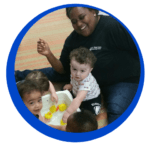Dear Dr. Day Care,
I have 2 toddler sons – 18 months and 2 ½ years old. They are always together. At least three times a day (some days it seems like a lot more!) my 18-month-old bites his brother. What can we do to stop this behavior?
Signed,
Ouch He Bit Me!


Dear Ouch,
Biting is one of the most frequent questions I have received in my career! Over the course of my 47 years working in child development, I have found that parents often have the most concerns about biting, sleeping, or eating.
Fortunately, biting is a stage. I understand that it is a very difficult stage to get through!
Toddlers bite for a number of reasons, so it is important to start by examining the reason. Is your son biting when he is frustrated or upset? Teething or hungry? Sometimes children bite to receive extra attention. Start by examining what is happening before he bites. Be proactive when those situations occur in the future.


Oftentimes biting occurs during moments of frustration, excitement, or when transitioning from one activity to another. It is during these moments when I frequently see children bite whoever is nearby at the time. Ensure there is close adult supervision. Assume the child may bite and move quickly to intervene.
The most effective method to divert biting is close supervision and redirection.
It is also helpful to use age-appropriate language. Give advanced warnings when transitioning from activities. Try saying “Mikey, in 2 minutes we are going to put your coat on and go outside for a walk.” Give another reminder closer to the time to change activities. Try counting together to reinforce math skills by saying “When we get to the number 5 we will go outside, ready? 1 – 2 – 3 – 4 – 5!” Allow your son to feel he is in control as much as possible. Instead of immediately helping him put his coat on, ask if he wants to put his right arm or left arm in the coat first. This helps to divert frustration, ease transitions, and give feelings of control, which will begin to reduce biting.


If your son does bite, it is very important to immediately separate the children. Respond firmly to the biter in very clear language, “No biting. Biting hurts.” Avoid yelling or shaming the child who bit. Don’t use negative labels such as calling your son a “biter,” instead point out the effects of the biting. “Look, your brother is crying. He is crying because you bit him. Biting hurts.” Ensure the majority of your attention immediately after the bite is focused on the child who received the bite.
Also ensure that the adults in his life are working together as a team. Meet with your son’s teachers, pediatrician, and other family members. Make sure you are all helping your son progress through this stage and to ensure there are no other underlying concerns.
Sincerely,


Dr. Mary Ann Shallcross Smith
Founder, Dr. Day Care
“Dr. Day Care” is Mary Ann Shallcross Smith, Ed.D., CEO/President of Child Care Consultants & Facilities Management, Dr. Day Care Learning Center, Kids Klub, and Therapeutic Child Care Services. We educate infant, toddler, preschool, kindergarten, and school-age/camp children.
“Dr. Day Care” can be reached anytime by calling 401-723-2277 x 222 or by e-mail at drdaycare@drdaycare.com. For additional Parent Resources, such as informational videos, visit our website at: www.drdaycare.com. Mary Ann also recently wrote a children’s book about educational opportunities that you can read to your child: Edgar Graduates, find it on Amazon at: bit.ly/EdgarGraduates
Images from unsplash.com

